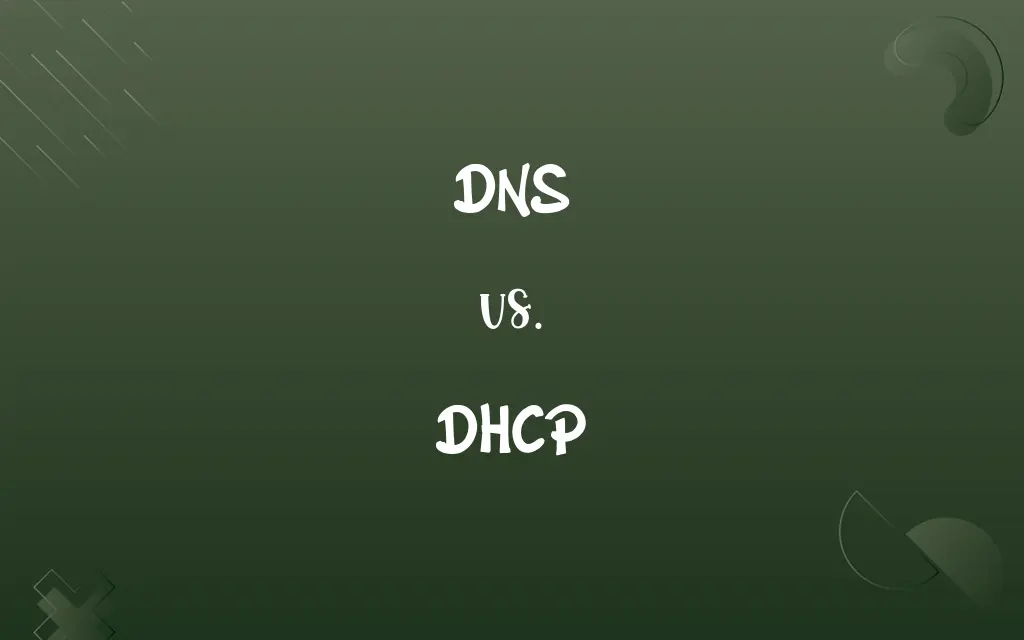DNS vs. DHCP: Know the Difference

By Shumaila Saeed || Updated on December 25, 2023
DNS (Domain Name System) translates domain names to IP addresses, enabling internet browsing; DHCP (Dynamic Host Configuration Protocol) assigns IP addresses to devices on a network.

Key Differences
DNS, or Domain Name System, functions like a phone book for the internet, translating human-readable domain names (like www.example.com) into IP addresses that computers use to identify each other on the network. DHCP, or Dynamic Host Configuration Protocol, on the other hand, is a network management protocol used to automate the process of configuring devices on IP networks, assigning unique IP addresses to each device.
Shumaila Saeed
Dec 08, 2023
A key aspect of DNS is its role in facilitating internet browsing. When you enter a website name, DNS servers translate that name into an IP address, allowing your browser to establish a connection to the website's server. DHCP simplifies network management by automatically assigning IP addresses to devices, ensuring each device has a unique address and can communicate on the network without IP conflicts.
Shumaila Saeed
Dec 08, 2023
DNS operates on a hierarchical system with different levels of DNS servers (root, TLD, and authoritative servers) working together to resolve domain names. DHCP operates within a local network and is typically managed by a router or a dedicated DHCP server which dynamically allocates IP addresses from a defined pool, avoiding the need for manual network configuration.
Shumaila Saeed
Dec 08, 2023
Both DNS and DHCP are crucial for the smooth operation of internet and network services. While DNS is essential for translating domain names to IP addresses for web browsing, DHCP is fundamental for the automatic configuration of network devices, making them operational on an IP network.
Shumaila Saeed
Dec 08, 2023
In summary, DNS and DHCP serve different but complementary roles in network management. DNS provides the necessary translation of domain names to IP addresses, facilitating human interaction with the internet, while DHCP offers efficient and
Shumaila Saeed
Dec 08, 2023
ADVERTISEMENT
Comparison Chart
Primary Function
Translates domain names to IP addresses
Assigns IP addresses to devices on a network
Shumaila Saeed
Dec 08, 2023
Configuration Role
Resolves names to IP for user access to websites
Automates IP address allocation for network devices
Shumaila Saeed
Dec 08, 2023
Hierarchy
Has a hierarchical structure with multiple levels
Operates at a single network level
Shumaila Saeed
Dec 08, 2023
Requirement
Essential for internet browsing
Necessary for network device configuration
Shumaila Saeed
Dec 08, 2023
ADVERTISEMENT
DNS and DHCP Definitions
DNS
DNS acts as the internet's phone book, converting domain names to IP addresses.
When you type www.google.com, DNS translates it to its IP address.
Shumaila Saeed
Dec 01, 2023
DHCP
DHCP simplifies network management by automating IP configurations.
Connecting a new printer to your network, DHCP configures its IP settings.
Shumaila Saeed
Dec 01, 2023
DNS
DNS ensures human-friendly domain names can be used to access websites.
Instead of remembering 172.217.0.0, DNS lets you use www.youtube.com.
Shumaila Saeed
Dec 01, 2023
DHCP
DHCP provides temporary IP addresses to devices on a network.
Your tablet gets a temporary IP from DHCP each time it joins the Wi-Fi.
Shumaila Saeed
Dec 01, 2023
DNS
DNS facilitates the location of computers and services on the internet.
DNS helps your computer find the server hosting www.reddit.com.
Shumaila Saeed
Dec 01, 2023
ADVERTISEMENT
DHCP
DHCP enables dynamic distribution of IP addresses in a network.
DHCP prevents IP conflicts by giving each device a unique address.
Shumaila Saeed
Dec 01, 2023
DNS
DNS is a hierarchical system for name resolution on the internet.
DNS servers at different levels work together to find the IP address for www.amazon.com.
Shumaila Saeed
Dec 01, 2023
DHCP
DHCP is a network protocol that automatically assigns IP addresses to devices.
When you connect your phone to Wi-Fi, DHCP assigns it an IP address.
Shumaila Saeed
Dec 01, 2023
DNS
DNS is a protocol that translates user-friendly domain names to machine-friendly IP addresses.
Www.netflix.com is converted by DNS to an IP address for connectivity.
Shumaila Saeed
Dec 01, 2023
DHCP
DHCP is essential for the scalable and flexible allocation of network addresses.
DHCP allows laptops in a coffee shop to seamlessly get online.
Shumaila Saeed
Dec 01, 2023
Repeatedly Asked Queries
How does DHCP work?
DHCP assigns IP addresses and other network configuration parameters dynamically to each device on a network.
Shumaila Saeed
Dec 08, 2023
Does DNS affect internet speed?
Indirectly, as slow DNS resolution can delay the loading of web pages.
Shumaila Saeed
Dec 08, 2023
Can a network function without DHCP?
Yes, but IP addresses would need to be assigned manually, making network management more complex.
Shumaila Saeed
Dec 08, 2023
Does changing DNS settings impact security?
It can, as some DNS providers offer additional security features.
Shumaila Saeed
Dec 08, 2023
What is DNS?
DNS is the system that translates human-readable domain names into computer-readable IP addresses.
Shumaila Saeed
Dec 08, 2023
Is DNS necessary for accessing the internet?
Yes, DNS is essential for translating website names into IP addresses, necessary for internet browsing.
Shumaila Saeed
Dec 08, 2023
What happens if DHCP fails in a network?
Devices may not be able to connect to the network properly, leading to connectivity issues.
Shumaila Saeed
Dec 08, 2023
Can DNS and DHCP work together?
Yes, they often work in tandem in a network, with DNS handling name resolution and DHCP managing IP addresses.
Shumaila Saeed
Dec 08, 2023
Can a device have a fixed IP address with DHCP?
Yes, through DHCP reservation, a device can be assigned a consistent, static IP address.
Shumaila Saeed
Dec 08, 2023
How does DNS handle domain name conflicts?
DNS uses a hierarchical system to ensure each domain name is unique and resolves correctly.
Shumaila Saeed
Dec 08, 2023
What is a DHCP lease?
It's the duration for which an IP address is assigned to a device by DHCP.
Shumaila Saeed
Dec 08, 2023
What is a DNS server?
A server that contains a database of public IP addresses and their associated hostnames.
Shumaila Saeed
Dec 08, 2023
Is DHCP secure?
Generally, yes, but it can be vulnerable to attacks like DHCP spoofing if not properly secured.
Shumaila Saeed
Dec 08, 2023
How does DHCP simplify network management?
By automatically assigning and managing IP addresses, reducing the need for manual configuration.
Shumaila Saeed
Dec 08, 2023
Are DNS servers always on the internet?
Mostly, but there can be private DNS servers within a specific network.
Shumaila Saeed
Dec 08, 2023
Can two devices have the same IP address in DHCP?
No, DHCP is designed to prevent IP address conflicts by assigning unique addresses.
Shumaila Saeed
Dec 08, 2023
What's a DNS cache?
A temporary storage that holds recently queried or accessed domain names and their IP addresses.
Shumaila Saeed
Dec 08, 2023
How do DNS queries work?
A DNS query is sent to resolve a domain name into an IP address, often through multiple DNS servers.
Shumaila Saeed
Dec 08, 2023
Can DHCP assign more than just IP addresses?
Yes, it can also assign subnet masks, gateways, and DNS server information.
Shumaila Saeed
Dec 08, 2023
How often does DHCP renew IP addresses?
Typically, halfway through the DHCP lease time, the device will request to renew its IP address.
Shumaila Saeed
Dec 08, 2023
Share this page
Link for your blog / website
HTML
Link to share via messenger
About Author
Written by
Shumaila SaeedShumaila Saeed, an expert content creator with 6 years of experience, specializes in distilling complex topics into easily digestible comparisons, shining a light on the nuances that both inform and educate readers with clarity and accuracy.






































































